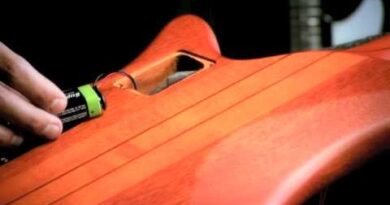5 Things EVERY Bass Player SHOULD Master
In this episode I discuss 5 Things EVERY Bass Player SHOULD Master.
BEATO EAR TRAINING → https://beatoeartraining.com
THE BEATO CLUB → https://bit.ly/322AGO1
BUY THE BEATO BOOK HERE → https://bit.ly/2kdWdTS
MY HELIX PRESETS →https://flatfiv.co/products/rick-beato-helix-pack-1
KEMPER PROFILES → https://bit.ly/34mF3EY
SUBSCRIBE HERE → http://bit.ly/2eEs9gX
——————————————————————————————————————
My Links to Follow:
YouTube – https://www.youtube.com/c/RickBeato
Follow my Instagram – https://www.instagram.com/rickbeato1/
Personal Facebook – https://www.facebook.com/rick.beato.1
Follow On Twitter – https://twitter.com/rickbeato
——————————————————————————————
Special Thanks to My Supporters:
Joe Armstrong
Brian Smith
Brandon Combs
Robert Hickerty
comboy
Alan Nance
Peter DeVault
Bill Grubbs
Phil Mingin
Tal Harber
Rick Taylor
Bill Miller
Gabriel Karaffa
Brett Bottomley
Matthew Porter
Frederick Humphrey
Paul Noonan
Scott Thompson
Todd Geisler
Harry Brocious
Jaime Villescas
Jeff Peters
Jared Vogt
Todd Geisler
Kaeordic Industries LLC
Duane Blake
Terry Van Belle
Ilya Kravchenko
Nathan Hanna
Thom Theriault
Kai Ellis
Zack Kirkorian
Joe Ansaldi
Jonathan Wentworth-Linton
Pzz
Marc Alan
Rob Kline
Calvin Wells
David Trapani
Will Elrics
Chris Defendorf
Debbie Valle
JP Rosato
Dave Hawkey
Orion Letizi
Mike Voloshen
Ashley Thompson
Peter Pillitteri
Jeremy Hickerson
Travis Ahrenholtz
#Bass #Player #Master
Originally posted by UCJquYOG5EL82sKTfH9aMA9Q at https://www.youtube.com/watch?v=9Vhl5HBS8Nc




thank u rick!
I'm confused
The bass is the easiest instrument to play but the hardest to be good at …
in producing i found putting the bass almost exactly with the kick drum gives both of them a fat sound that you can't get with either instrument alone…same with claps and snares
I'm a beginner and just got my first active pickup bass (which I love), but God damn has it been a crash course on the importance of muting. I try anyway, try to give every note and rest their appropriate value, but the active is super unforgiving.
I think people oughta be practicing with a metronome for about 5 years before they go thinking about getting in front of or behind the beat. Also, maybe learn your scales and get consistent fingerwork before you start worrying about making things easier for the sound guy, like WHAT?
Muting unplayed strings is a key factor!
Tip 1: Learn how to use space
Tip 2: learn how to use chord tones and inversions
Tip 3: understand the effect on tone playing at different parts on the bass (closer to the bridge or closer to the neck)
Tip 4: master muting the strings you're not playing
Tip 5: understand EQ points and mixing your bass tone
Tip 6: learn how to play with a drummer and your impact on the groove
… That was 6 tips
Very informative but a beginner or intermediate level player may not understand some of what you’re saying. Your terms and jargon are for more advanced players. If you’re trying to help less experienced or less skilled players, stop talking over our heads.
300hrtz on bass is also mud in a mix and can fight guitars so don't bump it up too much if your mix is muddy
I just tell bass players “Don’t fall asleep” – works everytime
I was hoping the 5 things were gonna be like, every other finger…
I learned that growing up from an amazing bass player, especially at these gigs.. playing just very slightly behind the kick. Especially when there’s sparse notes mainly following the kick like in country or better yet reggae. And after playing certain styles of music like that you begin to feel a very nice full pocket between the kick and the bass, it creates a less is more huge sound
String muting is absolutely necessary in the studio
Honky tonk woman: most bar band bass players play all the way through.
How to improve your bass playing -from a guitar player
I'm a new bassist (started November 2022) and I played in a thrash metal band for a decent amount of that time, and we had some great feedback from playing shows locally.
However, our lead guitarist and drummer recently kicked out the singer/rhythm guitar player, who had been in bands for 15 years, due to a lack of musical knowledge and talent. They kept me, because they said "you actually comprehend music and are an irreplaceable part of our sound, he didn't, and he wasn't."
It was extremely gratifying to hear, and we are now doing a prog trio thing that is letting us all push our creative boundaries much more than the previous project did.
My bass journey started late in life, at about 30, but I'm having a blast trying to become the type of bassist I've admired for years.
He is right. Pocket is the most important thing. If I had money in my pocket I wouldnt have endure youtube ads.
you guys know any free alternatives for bass plugins ??
My problem is I am playing bass for more than 10 years but I don't understand half a thing he's saying. I am that noob.
1. Timing
2. Timing
3. Timing
Ti 4. ming
i think its time you talk about
CharlesBerthoud
Where can one learn this dark sorcery ??
I'm an absolute beginner bass player (less than a month of learning) and I don't understand any of the terminology in this video lol
I have to correct you on something. If the bass player makes a mistake everyone notices. If the guitar makes a mistake everyone assumes it’s the bass.
Cool ty
I was going to say that if you're a fellow metal head, try playing along to whatever dance music and pop you can stand. All that stuff about space and pocket makes ten times more sense in these musical contexts, and you'll find your instrument is much more at the forefront, instead of being buried under guitars. It has a cool feeling of, 'this music is here for me!'
If you have a five-string (great!), learn C major's frets on the first five frets of the B and E string, and then you can solo in A minor when you hit the A string.
I can barely hear the bass in the first two examples
who made that outro music? it's pretty killer.
And who the hell are you????
The only tip you’ll need: play it like you are a drummer. This is your 4 string drums, not a big guitar or bass or whatever. Play it like drums.
No one can distinguish your notes from each other, but when you mess up the rhythms even dogs go away.
WTF I'm not deaf but I don't hear th bass dropout un that horrible racket of a supposed example.
#5 should come first. Be solid and in the pocket.
Trust me when I played bass they noticed…. Cos
The walls were shakin, the earth was quaking, their minds were aching.. ????????????
Rick's last comment about playing ahead, on top of or, in front of the beat, is interesting to me. I have heard that bass notes, because the sound waves are large, should be played slightly in front of the beat to give the sound wave time to develop. I like to push the beat, but I think feel like doing so is kind of selfish. The drummer is left in an awkward place. I think soloists like to hear the bass push because pushing adds energy. I would love to hear Rick's thoughts about the impact of pushing the beat on other instruments, and how the bass player should react. Thank you.
can you get Billy Sheehan to do an interview? I think you two would really communicate a lot of good useable information for musicians.
Good video. Could you elaborate more on what you meant by “pocket”. maybe give a few examples
nice vid
Would love to see more about the bass!
Great tips, Rick. I appreciate you!
Would be great to have a video on pocket. Here's an idea — start with kick, snare, and bass exactly together. Then show what happens when you move each one behind or ahead (leaving the other two exactly together). That would be an original (all instruments exactly together) and six variations.
The part about string length at 3:35 doesn't match the physics. The picking position affects which harmonics are present in the vibrating string. If you pick at a point, you force the string to move at that point. So you won't get harmonics that are stationary at (or near) that point. Best to try all possible picking positions and use your ears.
'Amen' to all of that! Cheers Rick!